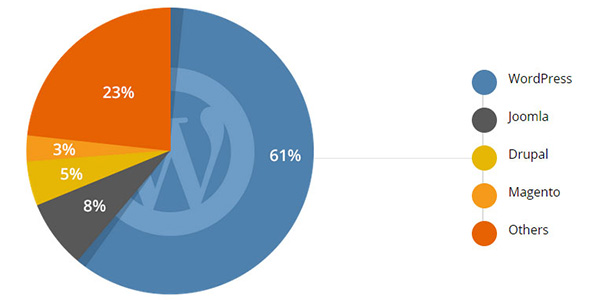CMS Overview
What is CMS ?
A Content Management System(CMS) is an application with the ability to create, modify and publish digital content. It allows users to collaborate in the creation, editing, and production of digital content: web pages, blog posts, etc. A CMS provides a graphical user interface with tools to create, edit and publish web content without the need to write code from scratch.
Whether you're creating a corporate website or an ecommerce store, a content management system (CMS) will enable you to control your site’s content, design, and functionality without knowing any code.
There are hundreds of CMS platforms in the market, each offering unique functionality to fulfill different business purposes. The most popular CMS tools are WordPress, Drupal , Joomla ,Magento etc.
Choosing a CMS that generates clean and validated code is critical and should always be on your list of requirements when reviewing your business CMS options.

CMS Market Share Numbers – With WordPress Far Out in the Lead
A Content Management System Components:
- A Content Management Application (CMA) : The graphical user interface (GUI) that lets a user create, modify, remove and publish content without ever needing to have knowledge programming languages.
- A Content Delivery Application (CDA) : Is responsible for the back-end services that manage and deliver content after it is in the CMA.
Key features in a CMS Solution
Important capabilities in a content management solution will include:
- Powerful Publishing Tools: Many CMS platforms have a WYSIWYG editor, short for “what you see is what you get,” which allows you create, edit, post, and manage web content (including text, images, video, and audio)
-
Intuitive Dashboard: At the core of every CMS is the Admin Dashboard. Every CMS should enable you to manage all the tasks involved in content production right in your dashboard.
Those tasks include:
- scheduling content
- monitoring threats
- tracking user activity
- installing modules and plugins
- reviewing performance analytics
- reviewing performance analytics
- Multilingual Support: Many CMS support multi-language content features that allows a content to reach customers in different countries speaking different languages,.
- Publishing Controls: Many CMS support creation of various roles and levels of access for managing content publication. Assigning different roles and levels of access within your CMS allows you to establish a workflow for creating, approving, and releasing different creative assets.
- Built-in SEO Tools: If SEO is important to your company, you will want a CMS that automatically handles basic on-page optimization tasks such as title tags, urls, alt tags on images, and a sound internal linking structure. CMS will have built in SEO tools to help you automatically create URLs that work for both readers and search engines. On top that Your CMS also help you add your meta descriptions, page titles, and authenticate with Google and Bing Webmaster Tools.
- Detailed Analytics: Many CMS support analytics either as built-in or integration with Google Analytics or another popular analytics tool. This provides users Insights like where your target personas are based, what device they’re using, how they’re interacting with content on different devices, and which pieces of content are most popular are crucial to refining your content strategy.
- Template Support: CMS help efficiency for your business with pre made templates. This usually let you change the look of your website i.e layout, colors, fonts, and other design aspects of a website.
- Training/Vendor Support: Many CMS system offer multiple levels of support, ranging from the basics such as extensive user manuals and documentation, to more advanced support options such as video training, certification, and live support staff. CMS platforms, particularly Wordpress and Drupal, come with very large developer communities. The advantage to a sizable community is the amount of online help and documentation you will find on most aspects of customization.
- Easy integration: Many of CMS platforms, come with very large set of plugin to integrate website to various platforms. One of the common integration is Social Media that drive referral traffic to your site. Many CMS have integrated social capabilities. Another crucial integration is being able to connect a personalized marketing presentation to your digital commerce systems.